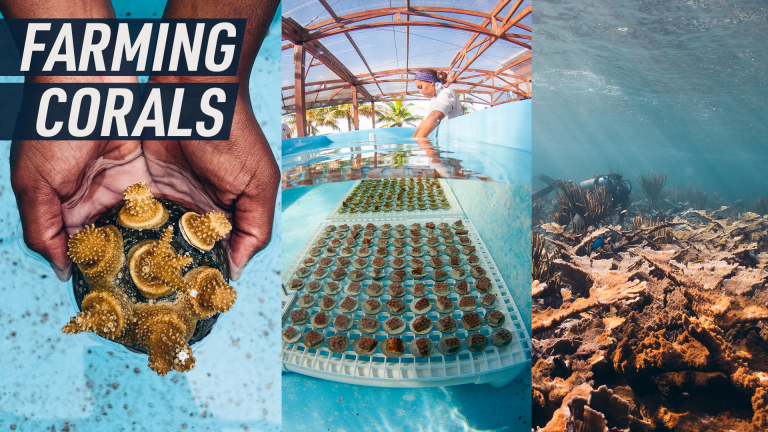
A coral farm in the Bahamas is proving that the most efficient way to restore coral reefs may be growing them on land.
Coral Vita is a reef restoration project which grows corals using microfragmentation — the process of cutting corals into small pieces and positioning them near each other to trigger a natural healing and accelerate the rapid growth of coral tissue.
While on the farm, corals are also exposed to managed stress such as water warming or acidification, to help cultivate their resilience — this process is also known as “assisted evolution.” Once fully grown, the corals are moved to degraded reef sites in the ocean where their impact is already noticeable.
“One of the restoration sites in Grand Bahama had 75 percent survivorship of corals after one year,” co-founder Sam Teicher tells Mashable. “In the Bahamas, if you have 30-50 percent survivorship after one year, that’s considered a good project. So we had one site 75 percent, another site 30 percent, another site 99 percent.”
During a mass bleaching in the summer of 2023, natural corals in the area were wiped out. But the corals Coral Vita planted, which had been given a resilience boost on the land farm, survived.
“There’s more work to be done,” Teicher says. “But seeing corals that we’ve grown with these more resilient approaches, surviving is still very encouraging considering the threats we face.”

Credit: Coral Vita
One of the elements that distinguishes Coral Vita from other reef restoration projects is that it is a for-profit organisation, which Teicher says was a conscious choice.
“Having previously myself worked for NGOs, and in the policy space in the environmental and climate sectors, and my co founder Gator [Halpern] working in academia and environmental science, we felt like many environmental challenges weren’t being solved rapidly or effectively enough by those sectors, despite the best intentions and hard work,” he says. “So what if we could create a company that can get entities to pay for restorations instead of a donation here and a grant there, which is how most coral farming projects are funded, which unfortunately limits a lot of the critically needed impact to keep reefs alive.”
Not dissimilar to the ‘polluter pays’ principle, Coral Vita asks sectors that benefit from coral reefs, from tourism and food industry, to invest in preserving the endangered ecosystems.
“We sell restoration to hotels, developers, governments, insurers, coastal property owners. Anyone who depends on the tourism, coastal protection, fisheries benefits of reefs, can hire Coral Vita to restore the reefs that they depend on,” says Teicher.
“And then we also use our farms as education centres for local communities, as well as tourism attractions. We have “Adopt a Coral” campaigns for individuals as well as brands and corporations who can fund restoration from wherever they are in the world if they believe in what we’re doing. We also license out our expertise and techniques that we develop to other coral restoration practitioners so that we can generate revenue to fund more work as well as use that expertise to help others deliver better restoration outcomes. So the whole idea is that if we can really catalyze a self sustaining restoration economy, that can eventually lead to planting the millions and billions of corals that are needed to keep reefs alive.”
Since the 1950s, the world has lost over half of its coral reefs to climate change and ocean pollution and we are on track to lose almost all of our corals by 2050. While Teicher admits that the actions that will have the greatest impact need to come from world leaders, he believes that Coral Vita is an example of what individuals and companies can do, while waiting on the implementation of state and international policies, to ensure coral reefs are still here for future generations.





















0 Comments